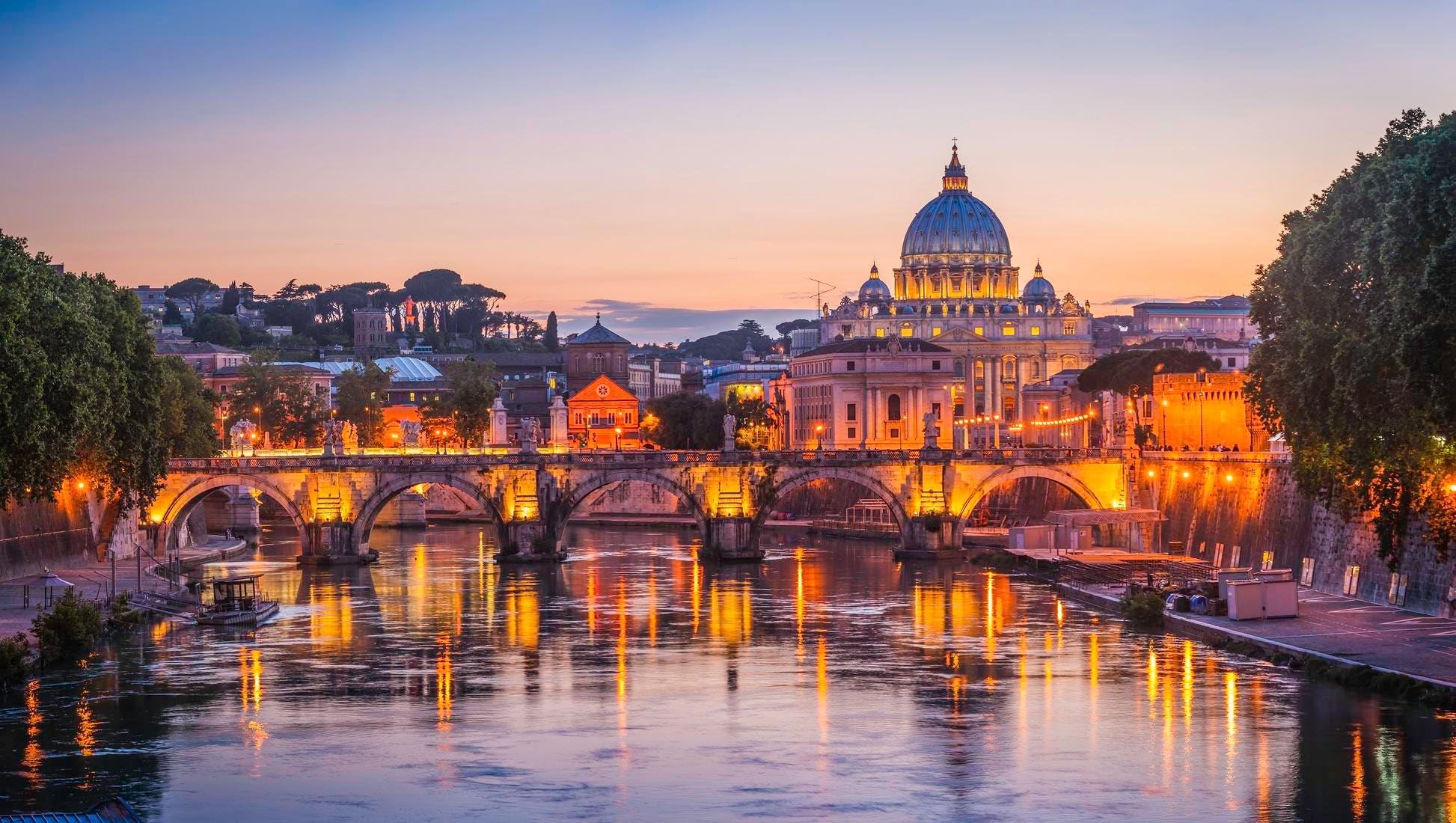Slow Rome: Get The Most Out Of A Long Weekend In The Eternal City
6 min read
Italy’s capital is affectionately known as The Eternal City with good reason. It is a living museum – an ode to the creativity, tenacity, brutality and vision of humankind over the ages. To wander its labyrinthine streets, gaze at its unfathomable arsenal of artworks, and marvel at the stories it has to tell is to experience one of the great cities of the world.
But with so much to see and do, it can be an overwhelming place to visit for a short break. Of course, for first timers Rome has the very definition of “must visit” attractions – the Colosseum, St Peter’s Basilica, the Pantheon, the Trevi Fountain, the Roman Forum and of course, the country within a city – the Vatican and its many museums.
These alone are enough to take up a week of your time and help you reach your annual step count target in double quick time. But beyond this “standard” (there’s nothing standard about it) tourist trail, Rome is also awash with astounding lesser-known buildings and churches, fantastic cafés and restaurants, and perfect piazzas to while away the days in, people and statue watching to your heart’s content. Here’s how to do it in style over a long weekend.
Stay: at the Villa Agrippina Gran Meliá
This sprawling palace on Gianicolo Hill on the fringes of trendy Trastevere and skirting the walls of Vatican City is an oasis of five star calm in the heart of Roman mayhem. It takes its name from Agrippina the Younger, famed Roman and mother of Emperor Nero, whose eponymous Villa sat on this very site nearly two thousand years prior. Later a convent, it is today a sprawling pink palazzo set in lush Mediterranean gardens that casts wide views over the city below it.
Villa Agrippina is set in extensive grounds complete with pool – a rare extravagance in Rome.
Francisco Guerrero 2012
It’s a rare thing for a hotel in the middle of urban Rome to describe itself as a “resort”, but stroll up Villa Agrippina’s olive and orange tree lined driveway into the walled grounds, perhaps pull up a lounger at the outdoor pool, and it feels exactly that – a world away from the chaos of city life.
But step into the marble and glass reception and your location is soon thrown back into sharp relief thanks to the vast Roman mask confronting you. These nods to the building’s history continue a theme that carries throughout the hotel’s shared spaces and into the rooms themselves. The journey to them, as with every aspect of a stay at Villa Agrippina is made seamless and easy thanks to the Gran Meliá group’s signature service levels, which are impeccable from arrival to departure.
Rooms are bright, luxurious and packed with bold design features that reflect Rome’s history.
Meliá Hotels
There are 110 rooms, suites and all new pool villa spread across a dozen or so categories, set down long corridors and hidden behind riveted bronze doors that pay homage to the building’s previous incarnation. All are luxurious – an almost historic aesthetic that mixes big-impact Baroque and Renaissance artwork and heavy curtains with muted colors and soft furnishings set against bare girders and glass-framed bathrooms. It’s an uncompromising approach that works in the context of the city and, thanks to floor to ceiling windows in every room, never feels gloomy in place of opulent.
Amaro Bar is Villa Agrippina’s ode to the Art Deco infused glamor of times gone by.
Meliá Hotels 2018
There to tempt you out of your room when the summer sun is shining, the outdoor pools and patio bar are a rare treat in Roman hotels, and in the cooler months the Clarins sponsored spa offers relief for sore tourist trod muscles, as long as you’re willing to pay up the extra €30 for entry. If not, the impeccably louche Amaro bar is the place to be – a decommissioned church done up in deco finery, it’s a great spot to grab a turquoise-painted alcove, settle down and sip genteel cocktails and unfussy tapas to the tinkering of the in-house pianist.
Fine dining restaurant Follie is as decadent in its decor as its food – almost.
Alberto Blasetti
For something a little more indulgent, Villa Agrippina’s Italian fine dining restaurant, Follie, is a culinary destination in Rome unto itself. Dark-wood lined, red-velvet cushioned and dominated by a giant (if slightly odd) painting of its head chef, Michelin-starred Luciano Monosilio, the “King of Carbonara”, eating at Follie is an indulgent, theatrical experience in the richest tradition of the Roman Empire. Go hungry.
Rooms at Villa Agrippina Gran Meliá start from €690 (around $730) a night and include breakfast.
Do: get lost in the wonder of it all
Sure, it’s a good idea to bookmark a few Big Things and, where necessary, buy tickets for them in advance to save on queuing. But Rome’s magic lies in its ability to surprise and invoke wonder around any street corner, so embracing that part of it fully will bring the city to life in surprising ways. Pick an area for each day you’re there, put on your comfiest (yet most stylish – this is Rome after all) sneakers and hit the cobblestones with your eyes up.
Lose yourself for hours in the old streets of Trastevere.
getty
As you’re staying in the area, it would be remiss not to kick things off with a stroll along the Tiber and into the impossibly atmospheric backstreets of Trastevere. Pick a couple of things to head for – the Basilicas di Santa Maria and di Santa Cecilia for example – and follow your nose from one to the next taking the time to investigate the trattorias, cafes, boutiques and mini museums that pepper the streets that connect and surround them.
Other days may beckon you to the Centro Storico, Rome’s ancient heart, to explore not only its extraordinary Renaissance palaces and Baroque piazzas but also its thriving squares where local markets rub shoulders with historic statues. Or perhaps Monti will catch your eye, its once debauched reputation replaced today with a bohemian chic set away from the masses. The key is to dive in without hesitation and see where the city takes you.
Eat: local and often
Where to begin? If you’ve done your walking tours right, much of your consumption will have happened ad hoc in the tiny local cafes, delicatessens, quick eateries and trattorias that are ubiquitous wherever you go.
Pick by the slice, pay by the weight at wonderful Forno Feliziani near Vatican City.
getty
If you emerge from the Vatican hungry, for example, drop by Forno Feliziani for fantastic local pizza, pasta and pastries where you pay by weight and eat from plastic trays. In the historic center don’t miss lunch at Sora Margherita, an historic trattoria tucked behind a straggly red curtain that serves the best Agnolotti cacio pepe e ricotta you’ll ever eat. Just pray it’s on the menu the day you’re there (and if it’s not, come back.)
In the evening, Roscioli should be on your radar – even if you’ve stopped by its deli in the daytime – to sample its mastery of artichokes and tomatoes and that signature Roman staple, Amatriciana. Dine at the bar for the full experience. And for a slice of real Roman pizza, make for Ai Marmi in Trastevere where locals outnumber tourists, queues can be long and the waiters are not to be messed with – but the pizza is undoubtedly worth the effort.
Cacio e pepe (literally: cheese and pepper) is a signature Rome dish – and unmissable.
getty
Drink: high brow and down low
If you fancy a change of scene from Amaro bar in Villa Agrippina, an aperitivo in the decadent Stravinskij Bar of the Hotel de Russie is worth splashing out for and a great way to digest the many sights of of an afternoon stroll through Tridente, Trevi and the Quirinale.
Should you find yourself in Monti with a thirst, make for Ai Tre Scalini (“the three steps”), a thriving enoteca with a great wine list, many craft beers and an always lively crowd. And in the Centro Storico, Il Goccetto is the archetypal vino e olio (wine and oil) shop with its chalkboard menus, bottle-lined walls and heavy wooden furniture complimented by a huge wine list, tasty grazing plates and fair prices.
A classic vino e olio (wine and oil) shop should be a stop on every visit.
Il Goccetto
For something more adventurous, search out Keyhole – an ultra hip speakeasy hidden behind a black door covered in keyholes in Trastevere where the clientele are as exquisite as the cocktails.



